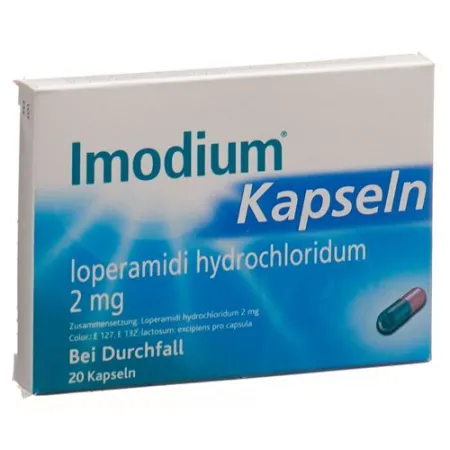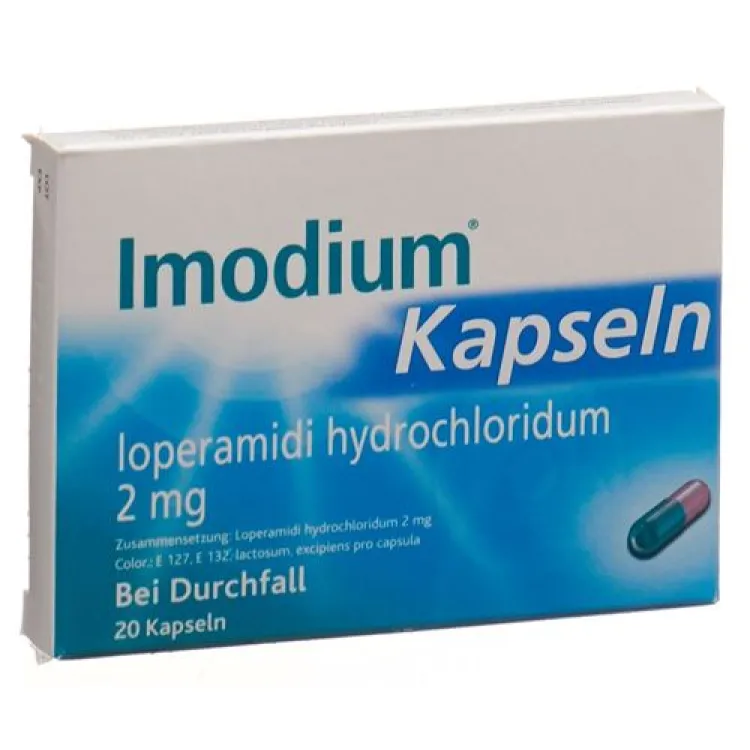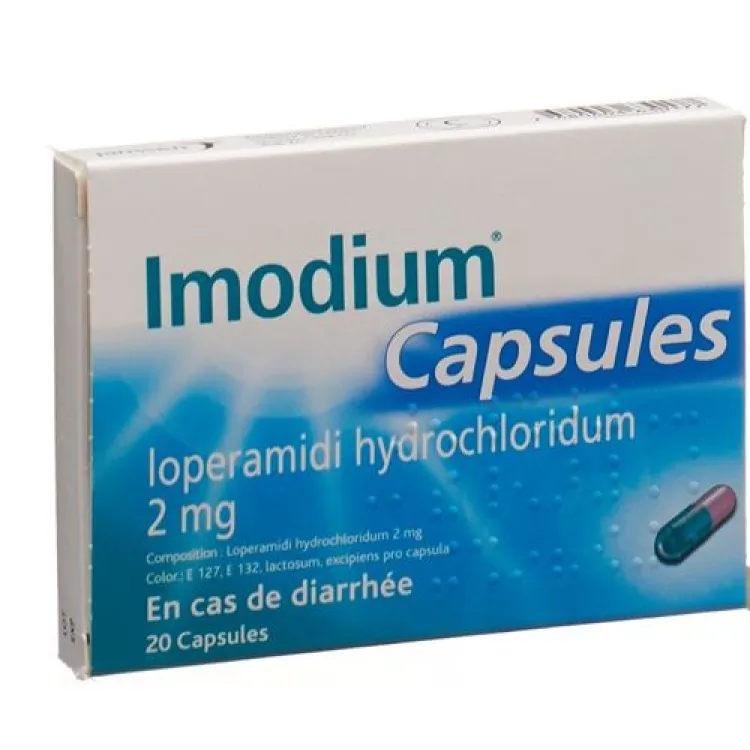Imodium caps 2 mg 20 pcs
Imodium Kaps 2 mg 20 Stk
-
19.96 USD

- Availability: In stock
- Distributor: JOHNSON & JOHNSON
- Brand: Imodium
- Product Code: 755307
- ATC-code A07DA03
- EAN 7680403630177
Ingredients:
Description
Imodium/Imodium lingual is a highly effective remedy for sudden (acute) and prolonged (chronic) diarrhea of various causes. Imodium/Imodium lingual can also be used on doctor's orders for diarrhea that can occur after surgery to shorten the small intestine. It inhibits bowel movement by acting directly on the bowel muscles, making the stool thicker and reducing the number of bowel movements. The effects of the orodispersible tablets and hard capsules can be felt after about two hours.
Imodium®/- lingual
What is Imodium/Imodium lingual and when is it used?
Imodium/Imodium lingual is a highly effective remedy for sudden (acute) and prolonged (chronic) diarrhea of various causes. Imodium/Imodium lingual can also be used on doctor's orders for diarrhea that can occur after surgery to shorten the small intestine. It inhibits bowel movement by acting directly on the bowel muscles, making the stool thicker and reducing the number of bowel movements. The effects of the orodispersible tablets and hard capsules can be felt after about two hours.
When should Imodium/Imodium lingual not be taken?
Imodium hard capsules and Imodium lingual orodispersible tablets should not be given to children under the age of 6 years.
Imodium/Imodium lingual must not be used:
- if you are allergic to loperamide or any of the excipients.
- if you suffer from severe liver disease.
- if you have severe diarrhea associated with high fever and/ or mucous-bloody stool.
- if you suffer from a sudden onset of severe inflammation of the large intestine (e.g. ulcerative colitis).
- if you suffer from a bacterial intestinal inflammation which is caused by the pathogens that penetrate the intestinal wall.
- if you suffer from diarrhea that occurs during or after taking antibiotics.
- if you suffer from conditions that cause inhibition of bowel movements should be avoided, e.g. constipation, intestinal blockage and abdominal distension.
If you suffer from one of the diseases mentioned, please tell your doctor.
When should you be careful when taking Imodium/Imodium lingual?
Although Imodium/Imodium lingual will stop the diarrhea, Imodium/Imodium lingual will not stop the cause treated. If possible, the cause of the diarrhea should be treated.
A sudden attack of diarrhea is usually stopped by Imodium/Imodium lingual within 48 hours. If there is no improvement within 48 hours, you should stop taking Imodium/Imodium lingual and consult your doctor.
If you have AIDS and are taking Imodium/Imodium lingual to treat diarrhea, stop taking Imodium/Imodium lingual immediately and tell your doctor at the first sign of a bloated or swollen abdomen.
Abuse and misuse of loperamide hydrochloride, the active ingredient in Imodium/Imodium lingual, have been reported. Only take Imodium/Imodium lingual for the indicated indications. The maximum daily dose must not be exceeded.
Long-term or regular use of Imodium/Imodium lingual should be done under the supervision of a healthcare practitioner.
Also tell your doctor if you have liver problems as you may need medical supervision during treatment with Imodium/Imodium lingual.
If you are taking medicines that reduce gastro-intestinal activity, you should tell your doctor as this may make the effect of Imodium/Imodium lingual too strong.
Fatigue, dizziness and light-headedness can often occur during diarrhea. This can impair reactions, the ability to use tools or machines and the ability to drive.
Imodium hard capsules
- contain lactose. Please only take Imodium hard capsules after consulting your doctor if you know that you suffer from an intolerance to sugar.
Imodium lingual orodispersible tablets
- contain 0.75 mg aspartame per orodispersible tablet (equivalent to 0.42 mg phenylalanine). Aspartame is a source of phenylalanine. It may be harmful if you have phenylketonuria (PKU), a rare inherited disorder in which phenylalanine builds up because the body cannot break it down sufficiently.
- Contain less than 1 mmol sodium (23 mg ) per orodispersible tablet, i. it is almost «sodium-free».
- contain 0.00066 mg benzyl alcohol per orodispersible tablet. Benzyl alcohol can cause allergic reactions.
Tell your doctor or pharmacist if you are taking any of the following medicines:
- ritonavir (used to treat HIV infection),
- quinidine (used to treat abnormal heart rhythms),
- desmopressin (used to treat increased urination),
- Itraconazole or ketoconazole (used to treat fungal infections) or
- Gemfibrozil (used to lower cholesterol levels).
Tell your doctor, pharmacist or druggist or Your doctor, pharmacist or druggist if you
- suffer from other diseases,
- have allergies or
- take other medicines (including those you bought yourself!).
Can Imodium/Imodium lingual be taken during pregnancy or breastfeeding?
The doctor must decide whether to take Imodium/Imodium lingual during pregnancy.
You should not take Imodium/Imodium lingual if you are breast-feeding, as small amounts of the active ingredient pass into breast milk.
How do you use Imodium/Imodium lingual?
You lose a lot of fluids during diarrhea. Therefore, make sure that you drink more liquid than usual during the period of diarrhea. This is especially important for children and elderly patients. Your pharmacist can give you a special mix of salt and sugar. Along with water, this also replaces the salts lost during diarrhea. This solution is particularly suitable for children.
The dose of Imodium/Imodium lingual depends on age and the type of diarrhea.
You can take Imodium as hard capsules or as an orodispersible tablet.
You can take Imodium/Imodium lingual at any time of the day.
Imodium hard capsules are swallowed whole with some liquid.
Imodium lingual is placed on the tongue. The orodispersible tablet immediately melts on the tongue and is swallowed with saliva. Further fluid intake is not necessary.
Unless otherwise prescribed by the doctor:
Adolescents and adults
Sudden onset of diarrhea
Initial dose: 2 hard capsules or 2 orodispersible tablets.
Follow-up dose after each additional liquid stool: 1 hard capsule or 1 orodispersible tablet.
Maximum daily dose: 8 hard capsules or 8 orodispersible tablets.
Chronic diarrhea
As prescribed by the doctor.
Children from 6 to 12 years
Sudden onset of diarrhea
Starting dose: 1 hard capsule or 1 orodispersible tablet.
Follow-up dose after each additional liquid stool: 1 hard capsule or 1 orodispersible tablet.
Maximum daily dose: 3 hard capsules or 3 orodispersible tablets per 20 kg body weight.
For children, the maximum daily dose, regardless of body weight, must never be more than the maximum daily dose for adolescents and adults (8 hard capsules or 8 orodispersible tablets).
Chronic diarrhea
As prescribed by the doctor.
Once stool has returned to normal (firm and formed) or if no stool has been passed for more than 12 hours, treatment with Imodium/Imodium lingual should be stopped.
Strictly follow the dosage given in the package leaflet or prescribed by your doctor, especially for children. Never exceed the above maximum daily dose.
If you take more Imodium/Imodium lingual than you should
See a doctor as soon as possible, especially if you have any of the following Feeling symptoms: muscle stiffness, lack of coordination, drowsiness, constricted pupils, increased muscle tone, weak breathing, difficulty urinating, increased heart rate, irregular heartbeat or bowel obstruction.
Children may be more sensitive to CNS effects than adults.
Handling Imodium lingual orodispersible tablets
Because the rapidly disintegrating orodispersible tablets are fragile, Imodium lingual orodispersible tablets must not be pushed through the blister as this would damage them.
Imodium lingual orodispersible tablets are removed from the blister as follows:
- Pull off the foil corner at the marking;
- Remove the foil completely;
- Bend the blister;
- Remove the orodispersible tablet.
Stick to the dosage given in the package leaflet or as prescribed by your doctor. If you think the medicine is too weak or too strong, talk to your doctor, pharmacist or druggist.
What side effects can Imodium/Imodium lingual have?
The following side effects can occur when taking Imodium/Imodium lingual:
Common (affects 1 to 10 users in 100):
Headache, dizziness, constipation, nausea, flatulence.
Uncommon (affects 1 to 10 users in 1000):
Abdominal pain or upper abdominal pain, abdominal discomfort, dry mouth, vomiting, indigestion, skin rash.
Side effects observed in post-marketing experience, frequency of which cannot be determined:
Distension in the abdomen, hypersensitivity reactions, difficulty concentrating, impaired consciousness, increased muscle tone, loss of consciousness, drowsiness, muscle stiffness, constricted pupils, bowel obstruction or dilatation, severe skin reaction, difficulty urinating, itching, tiredness.
In rare cases, immediately after taking Imodium lingual orodispersible tablets, you may experience a burning or tingling sensation on the tongue, which will quickly subside.
If you get any side effects, talk to your doctor, pharmacist or druggist. This also applies in particular to side effects that are not listed in this leaflet.
Stop using Imodium/Imodium lingual and tell your doctor immediately if you notice or suspect any of the following symptoms. If so, you may need urgent treatment:
- sudden swelling of the face, lips or throat, shortness of breath, hives (also known as hives or urticaria), severe irritation, redness or blistering of the skin. These symptoms may be signs of hypersensitivity or an allergic reaction.
- extreme tiredness, lack of coordination, loss of consciousness.
- severe abdominal pain, swelling of the abdomen, or fever, which could indicate a blockage or dilatation of the bowel .
Some adverse events that have been reported with loperamide are commonly symptoms of the underlying diarrhea (abdominal pain, malaise, nausea, vomiting, dry mouth, tiredness, drowsiness, dizziness, constipation and flatulence ). These symptoms are often difficult to distinguish from adverse events.
What else needs to be considered?
The medicines may only be used up to the date marked «EXP» on the packaging.
Storage Instructions
Imodium Hard Capsules
Store at room temperature (15 - 25 °C). Keep in the outer carton in order to protect from light. Keep out of reach of CHILDREN.
Imodium lingual orodispersible tablets
Store at room temperature (15 - 25 °C). The preparation is sensitive to moisture and must not be stored outside the blister. Keep out of reach of CHILDREN.
Further information
Return expired medicines to your pharmacist.
Your doctor, pharmacist or druggist can provide you with further information. These people have the detailed information for specialists.
What does Imodium/Imodium lingual contain?
Active ingredients
1 Imodium hard capsule Contains 2 mg of loperamide hydrochloride
1 orodispersible tablet Imodium lingual contains 2 mg loperamide hydrochloride
Excipients
1 hard capsule contains: lactose monohydrate, corn starch, talc, magnesium stearate, gelatin, erythrosine (E 127), indigotine (E 132), black and yellow iron oxide (E172), titanium oxide (E171).
1 orodispersible tablet contains: Gelatine, mannitol (E 421), aspartame (E 951), sodium bicarbonate, mint flavoring (contains benzyl alcohol).
Total sodium content: 0.103 mg.
Approval number
40363, 52975 (Swissmedic).
Where can you get Imodium/Imodium lingual? What packs are available?
In pharmacies and drugstores, without a doctor's prescription
Packs of 20 hard capsules.
Packs of 20 orodispersible tablets.
In pharmacies only with a doctor's prescription
Packs of 60 hard capsules.
Authorization holder
Janssen-Cilag AG, Zug, ZG.
This leaflet was last checked by the Medicines Agency (Swissmedic) in October 2020.





